小学情态动词用法PPT讲稿
小学情态动词用法课件
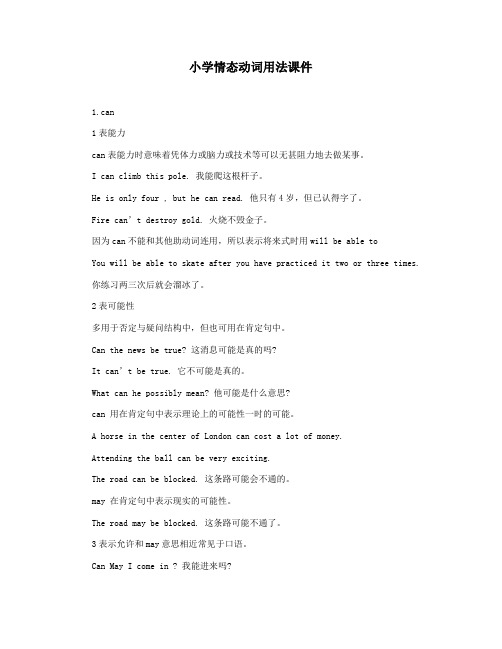
小学情态动词用法课件1.can1表能力can表能力时意味着凭体力或脑力或技术等可以无甚阻力地去做某事。
I can climb this pole. 我能爬这根杆子。
He is only four , but he can read. 他只有4岁,但已认得字了。
Fire can’t destroy gold. 火烧不毁金子。
因为can不能和其他助动词连用,所以表示将来式时用will be able toYou will be able to skate after you have practiced it two or three times.你练习两三次后就会溜冰了。
2表可能性多用于否定与疑问结构中,但也可用在肯定句中。
Can the news be true? 这消息可能是真的吗?It can’t be true. 它不可能是真的。
What can he possibly mean? 他可能是什么意思?can 用在肯定句中表示理论上的可能性一时的可能。
A horse in the center of London can cost a lot of money.Attending the ball can be very exciting.The road can be blocked. 这条路可能会不通的。
may 在肯定句中表示现实的可能性。
The road may be blocked. 这条路可能不通了。
3表示允许和may意思相近常见于口语。
Can May I come in ? 我能进来吗?Can I smoke here ? 我可以在这里抽烟吗?2.could的用法1表过去的可能和许可,多用于间接引语中At that time we thought the story could not be true.那时我们认为所说的事不可能是真的。
Father said I could swim in the river.爸爸说我可以在河里游泳。
《情态动词》PPT课件
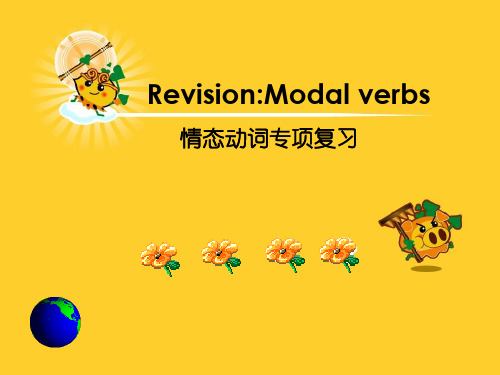
was/ were able to表示过去有能力并且成功地做了某事, 相当于managed to do something/ succeeded in doing something;
• Mr. Bush is on time for everything. How can it be that he was late for the opening ceremony? (表疑惑、惊讶)
表示请求、允许、允诺
1. 当对方是决策者时,你代表你(们)自己(I, We),或代表第三者(he,she,they)向对方 (you)请示或提出建议时用:
Revision:Modal verbs
情态动词专项复习
How many modal verbs
do you remember?
(情态动词)
一,常见的情态动词有:can, could, may, might ,must, shall, should, will, would, need, have to等
4、具有情态动词的某些特征的有:have(had) to, used to.
情态动词的特征
1、有一定的词义,但不能单独作谓语,它们要和行 为动词或连系动词连用,构成谓语。
2、适用于主语的各种人称和数 have to例外,主语 是第三人称单数时,要用has to)。如:
We/ He must work hard. 我们/他一定要努力工作。 I have to walk home. 我得步行回家。 He has to walk home. 他得步行回家。
情态动词语法 ppt课件

(3) 表示客观可能性即推测用法,多用于否定句和疑问句中, could只表示可能性比can小,不表时态。(否定推测) —Who is that man? Can it be your uncle? —No, it can’t be him. (4) can 也用在肯定陈述句中,表示理论上的可能性,意为“有 时可能会” Anybody can make mistakes. Even top students can make mistakes in the exam. 即使优秀学生在考试中也可能会出错。
ppt课件
14
(3)shall用在主语是第三人称的陈述句中,表示条约,规章,法令 等文件中表示义务或规定, 常用于官方文件中,表明具有法律效 力。(而should表示应该,义务)。 All payments shall be paid by the end of the month. 本月底所有款项必须付清。 No person shall carry a mobil phone into the examination room during the College Extrance Examination.
ppt课件 7
(2)may和might的用法
1. may和might表示请求、许可。 表示征求同意和允许,表征求同意时,might比may的语气更委 婉一些,否定回答时要用mustn’t表示“不可以”、“禁止”、“阻止” 之意。 may表示“允许”,否定形式为mustn't/can't,表示“禁止、不允 许、不可以”如: You may keep the book for a week. 这本书你可以保留一星期。 — Might I use your pen? — Yes, you may/can. —No, you mustn't/can't.
情态动词语法讲解PPT课件
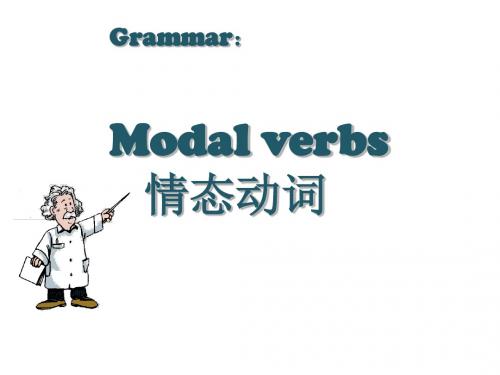
2表示“许可”和“不许”
a)请求对方“许可”可用can, could, may, might.
may/might较正式,could/might较委婉
表示给予“许可”通常用can/may,而不用 could/might
Could I use your phone? Yes, of course you can. Might I trouble you for a light? You may indeed.
表示将来的“必须”,常用have to的一定 形式(will/shall have to) 比较:
•We must do it again.(表示现在)
•We’ll have to do it again.(表示将来)
•表示过去的“必须”,常用had to
•I had to leave at six yesterday.
•They must be home by now.(他们现在一定到家了)
will/would表示“推测”可有三种情况
1)对特定事态的推测
A: Who’s that man over there? B: That will be George, no doubt. C: That would be George, I except.
• Can they have missed the bus?
• Yes, they may have.
may not重音落在助动词上,表示 “不可能”,重音落在否定词上,表 示“不许可” , 比较:
•He may not go tomorrow.
•He may not go tomorrow.
•所以在书面语中,表示“不可能” 常用can’t
小学英语语法课件-情态动词can (共34张PPT) 全国通用
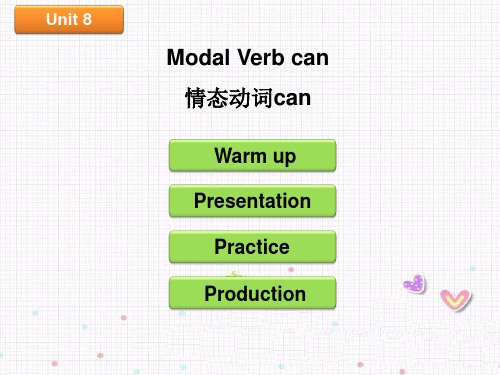
是的,可以。而且你还可以吃些蛋糕。 Birds can fly very high.
Hippos can’t fly and walk.
Lucy不可能在教室里面。
Presentation Sentences
Ostcrichacnan在’t fl句y. 子中表示允许,意为“可以” ,在口语中可以代替may。
Presentation Sentences
Can you please lend me your car? 你能借给我你的车用用吗? Could you help me with my English? 你能帮助我学英语吗?
can在句中表示请求,常用于“Can/Could you…?”句式。 can的过去式could用于现在时,可是语气更委婉,更客气。
What can bats do?
What can it do?
What can hippos do?
Can I come in ? 我可以进来吗? Can / Can’t I sit down?
Presentation Sentences
Dolphins can jump high and do tricks.
Practice Oral Practice 表示请求和许可:
我现在可以走了吗? 是的,可以。 不,不可以。
_C__a_n__ I go now? — Yes, you ___c_a_n_____. — No, you ___c_a_n_’_t____.
表示客观可能性:
Lucy不可能在教室里面。 Lucy _c_a_n_’_t___ be in the classroom.
— Can / Can’t he speak Japanese? — Yes, he can / can’t, but not well.
小学情态动词用法ppt课件

• (5)can开头的一般疑问句 以can和can’t 回答could开头的一般疑问句 以could和 couldn’t回答
为深入学习习近平新时代中国特色社 会主义 思想和 党的十 九大精 神,贯彻 全国教 育大会 精神,充 分发挥 中小学 图书室 育人功 能
二、特征
• 1.有一定词义,但不能单独作谓语,必须和行 为动词或系动词连用,构成谓语。
• 2.无人称和数的变化(have to例外:用于第三 人称单数时用has to)
• He has to stay here. • 3.后面接动词原形 • She should stay at home. • 4.具有助动词的作用,可用来构成否定句、疑
句中
• He can’t be in classroom. • (3)表示请求或允许,口语,“可以”相当
may
• You can go now.
为深入学习习近平新时代中国特色社 会主义 思想和 党的十 九大精 神,贯彻 全国教 育大会 精神,充 分发挥 中小学 图书室 育人功 能
• (4)could 是can的过去式,可以 会主义 思想和 党的十 九大精 神,贯彻 全国教 育大会 精神,充 分发挥 中小学 图书室 育人功 能
• 4.can’t 和 mustn’t • 否定推测:can’t “不可能” • mustn’t “禁止,不允许”,不能用于推
测 • must肯定句中表推测,“一定”
问句及简明回答 • --Can you sing an English song? • --yes, I can.
为深入学习习近平新时代中国特色社 会主义 思想和 党的十 九大精 神,贯彻 全国教 育大会 精神,充 分发挥 中小学 图书室 育人功 能
最新小学情态动词用法教学讲义PPT课件

三、用法
• 1.can, could • (1)表示能力,“能,会” • Can you play basketball? • (2)表示怀疑、猜测,常用于否定句和疑问
句中 • He can’t be in classroom. • (3)可以 • Can I help you?
Try and try
7.-the radio___________that there will be another heavy rain in Guangdong. _Too bad. It has rained for the whole week A tells B talks C says D speaks 8.It is nice of you to _________so much time showing me around your school A spend B cost C pay D take
try and try
1. May I stop my car here? No, you_____. A. can't B. mustn't C. needn't D. don't have to 2. Must we clean the house now? No, you _______. A. needn't B. may not C. mustn't D. can't 4. You ________ return the book now. You can keep it next week if you like. A. can't B. mustn't C. needn't D. may not 5. Johnny, you _______ play with the knife, you _______ hurt yourself. A. won't...can't B. mustn't...may C. shouldn't, must D. can't...shouldn't 6. -Would you go out for a walk with me?
小学情态动词的语法讲解优秀课件

练习:
肯定陈述句 否定陈述句
一般疑问句 肯定回答 否定回答
2. 你会骑马 You can___r_id_e___(ride)a horse.
You can’t ride a horse.
Can you ride a horse? Yes,I can. No,I can’t.
3.Lingling会游泳
肯定陈述句 Lingling can __s_w_i_m___(swim).
否定陈述句 Lingling can’t swim. 一般疑问句 Can lingling swim?
肯定回答 否定回答
Yes, she can. No,she can’t.
肯定陈述句 否定陈述句 一般疑问句 肯定回答
否定回答
练习:
一、把下列句子变为否定句。
• 1、Lingling can ride a horse. • 2、He can speak Chinese. • 3、Lingling and Daming can play the piano. • 4、My father can play table tennis. • 5、She can swim.
情态动词can的用法:
• 情态动词本身有一定的语义,表示说话人 的情绪、态度或语气。没有人称和数的变 化,can表示“能、会”,后接动词的原形。 如:
• I can sing.
• He can swim.
• They can play football.
情态动词can “能,会”,can not=can’t “不会,不能” can+动词原形
否定回答: No,they can’t.
单选题
1.___C_____you swim?No, I________ A. Can,can B. Can,don’t C.Can, can’t 2.Can you ride a bike?___C_____ A.Yes,you can B.No,you can’t C.Yes,I can. D.No,I cann’t 用can或can’t填空 1. __C__a_n____Tom speak French? No,he__c_a_n_’t__.But he__c_a_n___speak Chinese.
情态动词全部ppt课件

A.must
B.would
C.should
D.might
19
• 翻译 • ----我能在这个房间抽烟吗? .
---- 可以。 ---- 不行,… ----Might/ May I smoke in this room?
---- Yes, you can.
---- No, you mustn’t
20
rule.
(威胁)
26
Shall 决心、承诺、警告、命令 you \he\she\they shall…..(二三人称陈述)
When the chairman turns up, nobody shall say a word. 命令 Students shall remain in their seats until the papers have been
28
5. should
1. should表示义务、职责、劝告,意 为 “应该”。
eg: You should keep your promise. Students should respect teachers.
29
2)表示说话人_惊_讶______等特殊情感。
It’s surprising that Mary should not know Lei Feng.
3.must, need没有时态,但有些情态动词如can、 may,will,have to有一般式和过去式的变化。
4. 情态动词不能单独做谓语,必须和实义动词原形 一起构成谓语。
3
情态动词的“时态”形式并不是时间区 别的 主要标志, 不少情况下, 情态动词的 现在式 形式和过去式形式都可用来表 示现在时 间、过去时间和将来时间。
小学英语语法课件-情态动词can PPT课件 全国通用
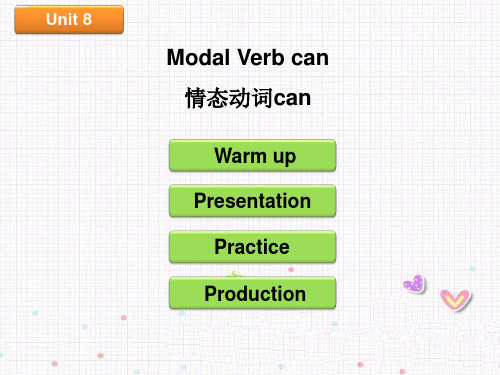
Dolphins can jump high and do tricks. Dolphins can’t fly. — Can dolphins see well and make lots of sounds? — Yes, they can. What can dolphins do?
小 学 英 语 语 法课件 -情态动 词can P PT课 件 全 国 通用
小 学 英 语 语 法课件 -情态动 词can P PT课 件 全 国 通用
Presentation
Sentences
1. 肯定句:主语+can +动词原形+其他 I can dance. 我会跳舞。
2. 否定句:主语+can’t+动词原形+其他 I can’t dance. 我不会跳舞。
3. 一般疑问句及回答:Can+主语+动词原形+其他? — Can you dance? 你会跳舞吗? — Yes, I can. / No, I can’t. 是的,我会。/不,我不会。
Sentences
He can’t be at home. 他不可能在家。 Can he come here today, please? 请问他今天能来这里吗?
can在句中表示可能,常用于否定句或疑问句中,指某种 可能性。
小 学 英 语 语 法课件 -情态动 词can P PT课 件 全 国 通用
小 学 英 语 语 法课件 -情态动 词can P PT课 件 全 国 通用
小 学 英 语 语 法课件 -情态动 词can P PT课 件 全 国 通用
Presentation
Sentences
Koalas and polar bears can climb fast and swim fast. Koalas and polar bears can’t fly. — Can koalas and polar bears eat fish and plants? — Yes, they can. What can koalas and polar bears do?
小学情态动词用法ppt课件

• (4)could 是can的过去式,可以表示过去的 能力
• I could swim when I was seven years old. • (5)can开头的一般疑问句 以can和can’t回答
could开头的一般疑问句 以could和couldn’t 回答
9
• 2.must • (1)“必须 应该” • (2)表推测“一定” • (3)否定句中,mustn’t表示禁止,“不允许” • Must开头的疑问句,肯定回答用must,否
定回答用needn’t(=don’t have to) “不需 要,不必”
10
• 3.have to • “have to+动词原形”:不得不做某事
• 注意:have to用于第三人称单数时用has to
11
1. May I stop my car here? No, you_____. A. can't B. mustn't C. needn't D. don't have to 2. Must we clean the house now? No, you _______. A. needn't B. may not C. mustn't D. can't 4. You ________ return the book now. You can keep it next week if you like. A. can't B. mustn't C. needn't D. may not 5. Johnny, you _______ play with the knife, you _______ hurt yourself. A. won't...can't B. mustn't...may C. shouldn't, must D. can't...shouldn't 6. -Would you go out for a walk with me? -No, I ______ . My girl friend is coming. A. wouldn't B. shall not C. won't D. shouldn't
情态动词的用法PPT课件
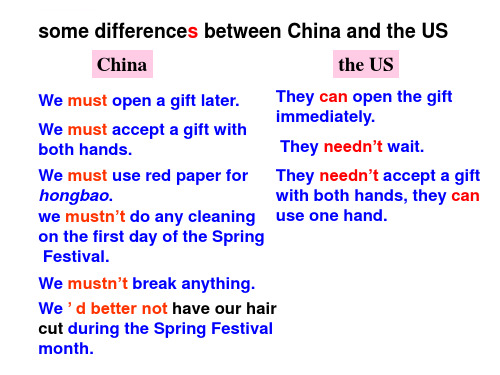
“雪亮工程"是以区(县)、乡(镇) 、村( 社区) 三级综 治中心 为指挥 平台、 以综治 信息化 为支撑 、以网 格化管 理为基 础、以 公共安 全视频 监控联 网应用 为重点 的“群 众性治 安防控 工程” 。
Exercises:
My brother was very ill, so I ( had to) call the doctor in the middle of the night.
“雪亮工程"是以区(县)、乡(镇) 、村( 社区) 三级综 治中心 为指挥 平台、 以综治 信息化 为支撑 、以网 格化管 理为基 础、以 公共安 全视频 监控联 网应用 为重点 的“群 众性治 安防控 工程” 。
some differences between China and the US
China
3 Underline the correct words.
注意: might为may的过去式,但也可以代替may, 语气较为婉转客气或更加不肯定。
“雪亮工程"是以区(县)、乡(镇) 、村( 社区) 三级综 治中心 为指挥 平台、 以综治 信息化 为支撑 、以网 格化管 理为基 础、以 公共安 全视频 监控联 网应用 为重点 的“群 众性治 安防控 工程” 。
— For your health, I’m afraid you ______. (2011贵州安顺)
A. may B. can C. have to D. need
“雪亮工程"是以区(县)、乡(镇) 、村( 社区) 三级综 治中心 为指挥 平台、 以综治 信息化 为支撑 、以网 格化管 理为基 础、以 公共安 全视频 监控联 网应用 为重点 的“群 众性治 安防控 工程” 。
情态动词用法课件
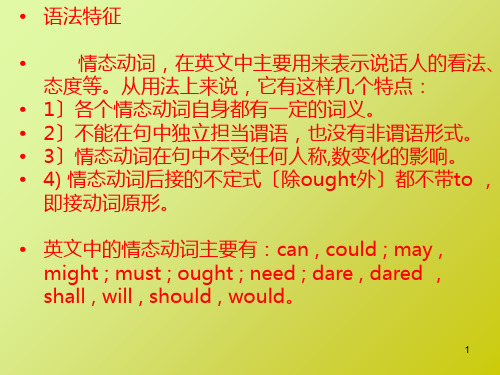
9
2) have to有人称、数、时态的变化,而must只有 一种形式。
He had to look after his sister yesterday.
3〕 在否认结构中: don't have to 表示"不必" mustn‘t 表示“禁止〞,
如:你现在可以走了Y。ou__m_a_y__g_o__n_o_w__._____________
表示没有把握的推测;〞或许,可能〞表示一件事 情或许会发生,只用在陈述句中。
如:他可能来,但我认为他不会来。 _____H__e_m__a_y__c_o_m__e_,_b_u_t_I__d_o_n_’_t _th__in_k__h_e__w_ill .
他不可能正在等你。 _H__e__c_a_n__’t__b_e__w__a_i_ti_n_g__f_o_r__y_o__u__. ____
他不可能已单独去那里了。 __H_e__c__a_n_’_t_h__a_v_e__g_o__n_e__t_h_e_r_e__a_l_o_n__g_ .
6
2 May 的用法 1〕 表示允许或请求;口语中常可与can替换。
他说他们必须努力工作。〔主观上要做这件事〕 _____H_e__s_ai_d_t_h_e_y_m_u_s_t_w__o_rk_h_a_r_d__. ____________
比较:I must leave now .(主观) I ‘m afraid you’ll have to leave now , it’s
• 语法特征
•
情态动词,在英文中主要用来表示说话人的看法、
态度等。从用法上来说,它有这样几个特点:
情态动词用法归纳(全)(课堂PPT)

You can use my dictionary. 你可以用我的 字典。
(4) 表示推测,意为“可能”, 常用于否 定句和疑问句中, 此时can’t 译为“ 不 可能”。 如:
She can swim fast, but I can’t . 她能游得很快,但我不能。
Can the news be true? 这个消息会是 真的吗?
3
一、 can, could
3) 表示客观可能性(客观原因形成的能力)。 They’ve changed the timetable, so we can go by bus
instead. This hall can hold 500 people at least.
4) 表示推测(惊讶、怀疑、不相信的态度),用于疑问句、否定句和感叹句中。
---- Yes, you must.
---- No, you don’t have to / you needn’t. 2) must是说话人的主观看法, 而have to则强调客观需要。Must只有一般现
在时, have to 有更多的时态形式。 1. I really must go now. 2. I had to work when I was your age.
It would be about ten o’clock when she left home.
13
七、should, ought to
1) should, ought to表示“应该”,ought to表示义务或责任,比should 语气重。
1. I should help her because she is in trouble. 2. You ought to take care of the baby.
- 1、下载文档前请自行甄别文档内容的完整性,平台不提供额外的编辑、内容补充、找答案等附加服务。
- 2、"仅部分预览"的文档,不可在线预览部分如存在完整性等问题,可反馈申请退款(可完整预览的文档不适用该条件!)。
- 3、如文档侵犯您的权益,请联系客服反馈,我们会尽快为您处理(人工客服工作时间:9:00-18:30)。
定回答用needn’t(=don’t have to) “不 需要,不必”
• 3.have to • “have to+动词原形”:不得不做某事
• 注意:have to用于第三人称单数时用has to
1. May I stop my car here? No, you_____. A. can't B. mustn't C. needn't D. don't have to 2. Must we clean the house now? No, you _______. A. needn't B. may not C. mustn't D. can't 4. You ________ return the book now. You can keep it next week if you like. A. can't B. mustn't C. needn't D. may not 5. Johnny, you _______ play with the knife, you _______ hurt yourself. A. won't...can't B. mustn't...may C. shouldn't, must D. can't...shouldn't 6. -Would you go out for a walk with me?
小学情态动词用法课件
动词种类
实义动词
系动词
情态动词
助动词
jump, run
be, feel
can, must, may…
do, does, did, be, have, has
1.---when did your uncle___in shanghai
---the day before yesterday
-No, I ______ . My girl friend is coming.
• 1.can, could • (1)表示能力,“能,会” • Can you play basketball? • (2)表示怀疑、猜测,常用于否定句和疑问
句中
• He can’t be in classroom. • (3)可以 • Can I help you?
• (4)could 是can的过去式,可以表示过去的
A arrive B get C reach
2.As we know, some people are good at________but bad at give
back
A lending B keeping C borrowing D using
3.The small child was not old enough to_________himself
A have B wear C dress D put on
5. My brother and I are _____ TV.
A watch B look C read D see
6.I ask Danny to________me my book, but he brough me his book
B talks
C says
D speaks
8.It is nice of you to _________so much time showing me around
your school
பைடு நூலகம்
A spend
B cost C pay
D take
一、情态动词
• can, could • must • have to • should • will(would) • may
二、特征
• 1.有一定词义,但不能单独作谓语,必须和行
为动词或系动词连用,构成谓语。
• 2.无人称和数的变化(have to例外:用于第三
人称单数时用has to)
• He has to stay here. • 3.后面接动词原形 • She should stay at home.
三、用法
能力
• I could swim when I was seven years old.
• (5)can开头的一般疑问句 以can和can’t回答
could开头的一般疑问句 以could和couldn’t 回答
• 2.must • (1)“必须 应该” • (2)表推测“一定”
• (3)否定句中,mustn’t表示禁止,“不允许”
A take
B fetch C carry
D match
7.-the radio___________that there will be another heavy rain in
Guangdong.
_Too bad. It has rained for the whole week
A tells
